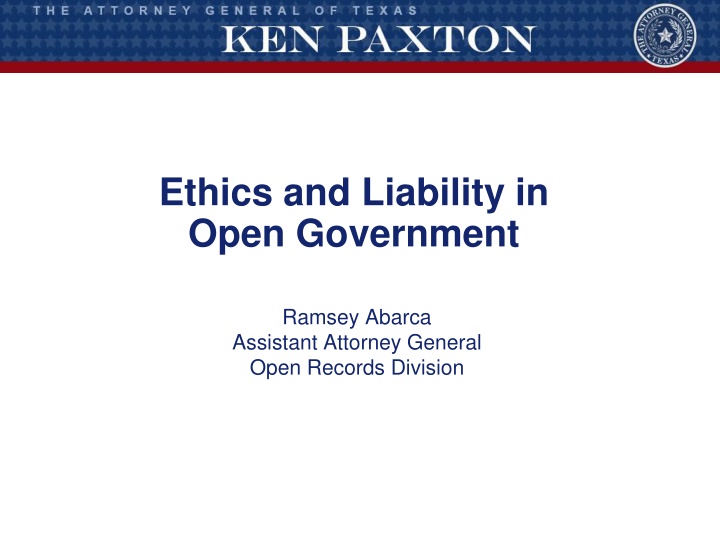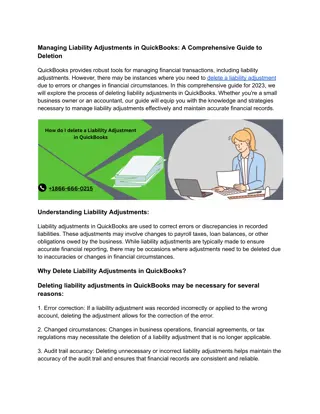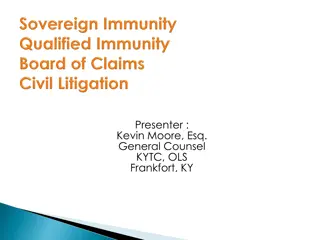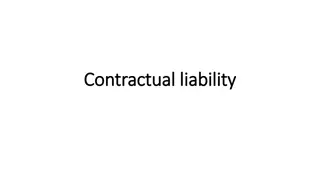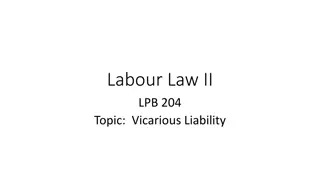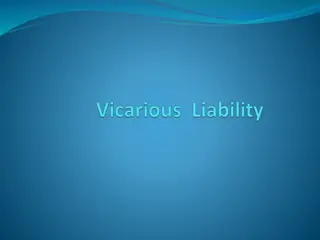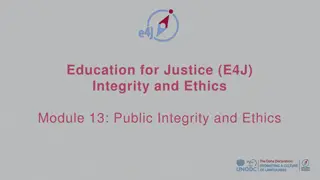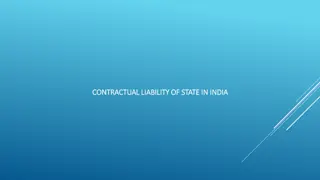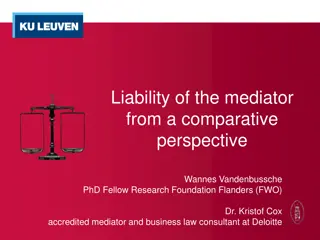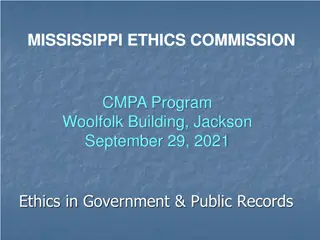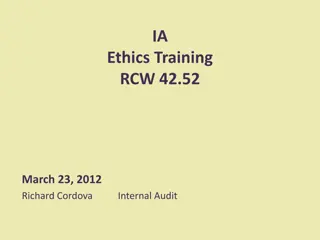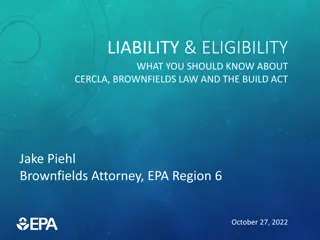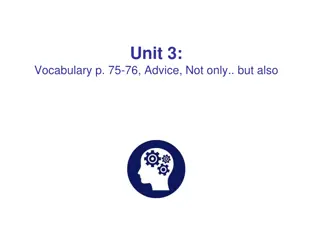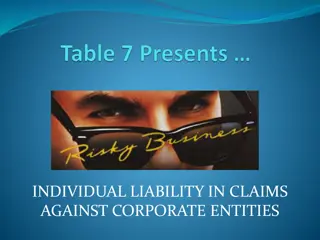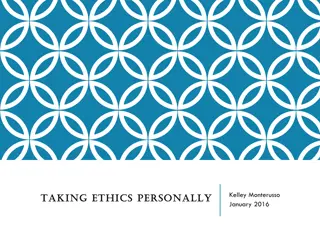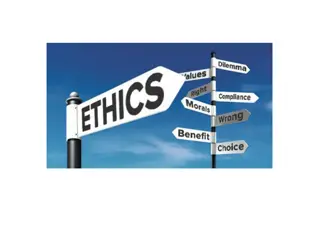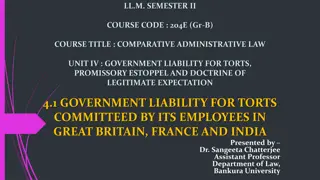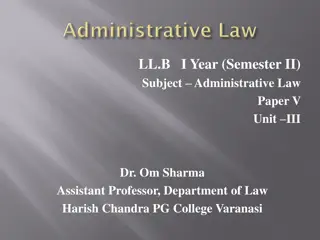Ethics and Liability in Open Government: Policy on Public Information Act
This content delves into the policy framework surrounding public information disclosure in government settings, emphasizing transparency and accountability to the public. It discusses the rights of individuals to access information about government affairs and the responsibilities of public officials to uphold these principles. Through a series of slides, key aspects of the Public Information Act Policy are explored, highlighting the fundamental philosophy of government as a servant of the people.
Download Presentation

Please find below an Image/Link to download the presentation.
The content on the website is provided AS IS for your information and personal use only. It may not be sold, licensed, or shared on other websites without obtaining consent from the author.If you encounter any issues during the download, it is possible that the publisher has removed the file from their server.
You are allowed to download the files provided on this website for personal or commercial use, subject to the condition that they are used lawfully. All files are the property of their respective owners.
The content on the website is provided AS IS for your information and personal use only. It may not be sold, licensed, or shared on other websites without obtaining consent from the author.
E N D
Presentation Transcript
Ethics and Liability in Open Government Ramsey Abarca Assistant Attorney General Open Records Division
Public Information Act Policy (Slide 1 of 4) Section 552.001. Policy; Construction Under the fundamental philosophy of the American constitutional form of representative government that adheres to the principle that government is the servant and not the master of the people, it is the policy of this state that each person is entitled, unless otherwise expressly provided by law, at all times to complete information about the affairs of government and the official acts of public officials and employees. This chapter shall be liberally construed in favor of granting a request for information.
Public Information Act Policy (Slide 2 of 4) Section 552.001. Policy; Construction Under the fundamental philosophy of the American constitutional form of representative government that adheres to the principle that government is the servant and not the master of the people, it is the policy of this state that each person is entitled, unless otherwise expressly provided by law, at all times to complete information about the affairs of government and the official acts of public officials and employees. This chapter shall be liberally construed in favor of granting a request for information.
Public Information Act Policy (Slide 3 of 4) Section 552.001. Policy; Construction Under the fundamental philosophy of the American constitutional form of representative government that adheres to the principle that government is the servant and not the master of the people, it is the policy of this state that each person is entitled, unless otherwise expressly provided by law, at all times to complete information about the affairs of government and the official acts of public officials and employees. This chapter shall be liberally construed in favor of granting a request for information.
Public Information Act Policy (Slide 4 of 4) Section 552.001. Policy; Construction Under the fundamental philosophy of the American constitutional form of representative government that adheres to the principle that government is the servant and not the master of the people, it is the policy of this state that each person is entitled, unless otherwise expressly provided by law, at all times to complete information about the affairs of government and the official acts of public officials and employees. This chapter shall be liberally construed in favor of granting a request for information.
What is public information? 552.002(a) Gov t Code Public Information means information that is written, produced, collected, assembled, or maintained under a law or ordinance or in connection with the transaction of official business: by a governmental body; for a governmental body and the governmental body owns the information, has a right of access to it, or spends or contributes public money for the purpose of writing, producing, collecting, assembling, or maintaining the information; or by an individual officer or employee of a governmental body in the officer s or employee s official capacity and the information pertains to official business of the governmental body.
What is public information? Virtually all information a governmental body has is public Information. When you receive a request, the responsive information will probably be public information. Public information may be confidential or determined to be excepted from disclosure but it remains public information. Thus, each person is entitled to it, unless otherwise expressly provided by law.
The Public Information Act in Brief Chapter 552, Government Code Any public information held by, or maintained for, a governmental body must be released to the public unless an exception to disclosure applies. Public information must be released promptly. A governmental body that seeks to withhold public information from disclosure generally must obtain a ruling from the Office of the Attorney General, adhering to the 10- and 15-business-day deadlines. Civil remedies and criminal penalties are available if a governmental body fails to comply with the requirements of the Act.
Ethical Responsibility The Public Information Act is the applicable law. Ethical responsibilities apply in addition to the law. What ethical standards apply?
Texas Oath of Attorney Section 82.037(a) of the Government Code. Each person admitted to practice law shall, before receiving a license, take an oath that the person will: Support the constitutions of the United States and this state; Honestly demean oneself in the practice of law; Discharge the attorney s duty to the attorney s client to the best of the attorney s ability; and conduct oneself with integrity and civility in dealing and communicating with the court and all parties.
The Texas Lawyers Creed Professional standard set by the Texas Supreme Court and Texas Court of Criminal Appeals I will advise my client that we will not pursue tactics which are intended primarily for delay. I will advise my client that we will not pursue any course of action which is without merit.
A Lawyers Ethical Responsibility Preamble to Texas Disciplinary Rules of Professional Conduct ( TDRPC ): As negotiator, a lawyer seeks a result advantageous to the client but consistent with requirements of honest dealing with others. A lawyer should use the law s procedures only for legitimate purposes and not to harass or intimidate others. A lawyer should demonstrate respect for the legal system and for those who serve it, including judges, other lawyers and public officials.
Timeliness Ethical Requirement In representing a client, a lawyer shall not use means that have no substantial purpose other than to embarrass, delay, or burden a third person, or use methods of obtaining evidence that violate the legal rights of such a person. TDRPC Rule 4.04.
Representations to the OAG Ethical Requirements In representing a client, a lawyer shall not: Neglect a legal matter entrusted to the lawyer; or Frequently fail to carry out completely the obligations that the lawyer owes to a client or clients. TDRPC 1.01 In the course of representing a client a lawyer shall not knowingly: Make a false statement of material fact or law to a third person[.] TDRPC 4.01
Representing Your Client Ethical Requirements A client is entitled to straightforward advice expressing the lawyer s honest assessment. Legal advice often involves unpleasant facts and alternatives that a client may be disinclined to confront. However, a lawyer should not be deterred from giving candid advice by the prospect that the advice will be unpalatable to the client. It is proper for a lawyer to refer to relevant moral and ethical considerations in giving advice. TDRCP 2.01 A lawyer shall be subject to discipline because of another lawyer's violation of these rules of professional conduct if: The lawyer is a partner or supervising lawyer and orders, encourages, or knowingly permits the conduct involved. TDRPC 5.01
Acting as a Lawyers Representative TDRPC Rule 5.03 A lawyer who has direct supervision over a non-lawyer must take reasonable steps to ensure the employee s conduct is compatible with the professional obligations of the lawyer. A lawyer can be subject to discipline if an employee engages in behavior that would be considered a violation of the rules. Comment: A lawyer should give such assistants appropriate instruction and supervision concerning the ethical aspects of their employment[.]
Texas Police Chiefs Association Code of Ethics established for members Members of TPCA represent that the primary function of the police executive is to serve the best interests of the community and the law enforcement profession. Members of TPCA shall encourage friendly and courteous service and strive to improve communications with all members of the community, at all times seeking improvement in the quality and image of public service. Members shall not disclose to others or use to further the personal interest of themselves or others, confidential information acquired by them in the course of their official duties.
Texas City Management Association Code of Ethics established for members Be dedicated to the concepts of effective and democratic local government by responsible elected officials and believe that professional general management is essential to the achievement of this objective. Affirm the dignity and worth of the services rendered by government and maintain a constructive, creative, and practical attitude toward urban affairs and a deep sense of social responsibility as a trusted public servant. Keep the community informed on local government affairs; encourage communication between the citizens and all local government officers; emphasize friendly and courteous service to the public; and seek to improve the quality and image of public service.
Texas Municipal Clerks Association Code of Ethics established for members To be ever mindful of my neutrality and impartiality, rendering equal service to all and to extend the same treatment I wish to receive myself. To record that which is true and preserve that which is entrusted to me as if it were my own.
Big City Ethics Ordinance City officials shall act and conduct themselves, both inside and outside the city s service, so as to give no occasion for distrust of their integrity, credibility or devotion to the best interests of the city and the public trust that it holds. It shall be unlawful for any city official to disclose confidential information or use such confidential information to advance the personal interests of said official or others.
Small City Ethics Ordinance Public service is a public trust, built on respect for all people requiring that our elected officials obey the law and place ethical principles above private gain. The public should have confidence in the integrity of government. Government decisions and policy should be made within the proper channels of government structure, and citizens should be kept informed and educated about the issues facing their city. The city council shall keep the public informed through compliance with the spirit and intent of the Public Information Act and the Open Meetings Act of the Texas Government Code.
The Golden Rule Treat others as you would like to be treated. How would you like your public information request to be treated?
The Platinum Rule Treat others the way they would like to be treated. How would a particular requestor like you to treat their public information request?
Legal Consequences Legal and ethical standards apply to the application of the Public Information Act. What are the consequences of noncompliance?
Public Information Act Criminal Violations Gov t Code 552.351 Destruction, Removal, or Alteration of Public Information Gov t Code 552.352 Distribution or Misuse of Confidential Information Gov t Code 552.353 Failure or Refusal of Officer for Public Information to Provide Access to or Copying of Public Information Gov t Code 552.353 Affirmative defense available
Destruction, Removal, or Alteration of Public Information 552.351 Gov t Code Destruction, Removal, or Alteration of Public Information A person commits an offense if the person willfully destroys, mutilates, removes without permission as provided by this chapter, or alters public information. Fine not less than $25 or more than $4,000 and/or county jail not less than three days or more than three months Misdemeanor offense
Distribution or Misuse of Confidential Information 552.352(a) Gov t Code Distribution or Misuse of Confidential Information A person commits an offense if the person distributes information considered confidential under the terms of chapter 552 of the Government Code Fine not more than $1,000 and/or county jail for not more than six months Constitutes official misconduct
Failure or Refusal to Provide Access or Copying 552.353(a), (e)-(f) Gov t Code Failure or Refusal of Officer for Public Information to Provide Access to or Copying of Public Information Fails or refuses to give access, permit copying, or provide copies of public information with criminal negligence Fine not more than $1,000 and/or county jail for not more than six months Misdemeanor Offense Constitutes official misconduct
Affirmative Defense for Failure to Provide Access 552.353(b)-(d) Gov t Code Affirmative defense against prosecution Reasonable belief that public access to information not required and relied on court order court opinion, or OAG decision OAG decision sought and no decision issued Suit filed in Travis County challenging OAG decision and suit pending Officer s agent reasonably relied upon written instruction from the officer of public information
Public Information Act Civil Remedies Slide 1 of 4 552.321 Gov t Code Suit for Writ of Mandamus Used to compel a governmental body to make information available for public inspection Filed by requestor or Attorney General Examples of potential mandamus situations GB refuses to provide copies or access to information that is clearly public GB refuses to request an AG ruling GB refuses to release information as required by an unchallenged AG ruling
Public Information Act Civil Remedies Slide 2 of 4 552.3215 Gov t Code Declaratory Judgment or Injunctive Relief Complaint filed by requestor with district attorney or county attorney in county where governmental body is located Local governmental bodies: district attorney or county attorney for the county may bring action only in district court for that county where the governmental body is located State agencies: Travis County District Attorney or OAG may bring action only in district court in Travis County Before the 31st day after the date the complaint was filed, district or county attorney shall determine: Whether the violation was committed Whether an action will be brought Notify complainant in writing their determination
Public Information Act Civil Remedies Slide 3 of 4 552.323 Gov t Code Assessment of Costs of Litigation and Reasonable Attorney Fees A court shall assess costs of litigation and reasonable attorney fees incurred by the plaintiff who substantially prevails in an action seeking a writ of mandamus, declaratory judgment, or injunctive relief. Plaintiff in such cases will be the Office of the Attorney General, district attorney, or county attorney.
Public Information Act Civil Remedies Slide 4 of 4 Kallinen v. City of Houston, 462 S.W.3d 25 (Tex. 2015) City timely requested a ruling on applicability of exceptions. Requestor filed suit for mandamus under Gov t Code 552.321(a). Court of appeals held trial court lacks subject matter jurisdiction over mandamus suit until the Attorney General rules. Reversed. Attorney General does not possess exclusive jurisdiction over open records matters and requestor is not required to wait until a open records ruling is issued. But court has discretion to abate proceeding until AG rules.
Ethical Scenario - Slide 1 of 6 You are the public information officer for the City of Constant Requests. What legal and ethical issues do you find in the following scenario? You receive requests on the same day from both Beau Barker and Callie Curious, a reporter for the city newspaper The Constant Courier, for information pertaining to the city s new city manager. Mr. Barker left you a voicemail asking for information about for the city manager s resume and references. Ms. Curious submitted a written request via your online request system for all e-mails between the city manager and the city budget director regarding the new city park. You are able to the gather the responsive information to both requests in 7 business days. The city wants to withhold only some information.
Ethical Scenario - Slide 2 of 6 You are the public information officer for the City of Constant Requests. What legal and ethical issues do you find in the following scenario? You receive requests on the same day from both Beau Barker and Callie Curious, a reporter for the city newspaper The Constant Courier, for information pertaining to the city s new city manager. Mr. Barker left you a voicemail asking for information about for the city manager s resume and references. Ms. Curious submitted a written request via your online request system for all e-mails between the city manager and the city budget director regarding the new city park. You are able to the gather the responsive information to both requests in 7 business days. The city wants to withhold only some information.
Ethical Scenario - Slide 3 of 6 You are the public information officer for the City of Constant Requests. What legal and ethical issues do you find in the following scenario? You receive requests on the same day from both Beau Barker and Callie Curious, a reporter for the city newspaper The Constant Courier, for information pertaining to the city s new city manager. Mr. Barker left you a voicemail asking for information about for the city manager s resume and references. Ms. Curious submitted a written request via your online request system for all e-mails between the city manager and the city budget director regarding the new city park. You are able to the gather the responsive information to both requests in 7 business days. The city wants to withhold only some information.
Ethical Scenario - Slide 4 of 6 What legal and ethical issues do you find in the following scenario? You receive requests on the same day from both Beau Barker and Callie Curious, a reporter for the city newspaper The Constant Courier, for information pertaining to the city s new city manager. Mr. Barker left you a voicemail asking for information about for the city manager s resume and references. [You have a city application but no resume.] Ms. Curious submitted a written request via your online request system for all e-mails between the city manager and the city budget director regarding the new city park. You are able to the gather the responsive information to both requests in 7 business days. The city wants to withhold only some information.
Ethical Scenario - Slide 5 of 6 What legal and ethical issues do you find in the following scenario? You receive requests on the same day from both Beau Barker and Callie Curious, a reporter for the city newspaper The Constant Courier, for information pertaining to the city s new city manager. Mr. Barker left you a voicemail asking for information about for the city manager s resume and references. Ms. Curious submitted a written request via your online request system for all e-mails between the city manager and the city budget director regarding the new city park. [Most of the e-mails have attachments.] You are able to the gather the responsive information to both requests in 7 business days. The city wants to withhold only some information.
Ethical Scenario - Slide 6 of 6 What legal and ethical issues do you find in the following scenario? You receive requests on the same day from both Beau Barker and Callie Curious, a reporter for the city newspaper The Constant Courier, for information pertaining to the city s new city manager. Mr. Barker left you a voicemail asking for information about a dog bite incident at the center, including any body cam video. Ms. Curious submitted a written request via your online request system for all e-mails between the City Manager and the City Budget Director regarding the shelter s budget. You are able to the gather the responsive information to both requests in 7 business days. The city wants to withhold only some information.
Complaints to OAG Most common complaints: I made a request but have not received a response. You ordered them to release information and I haven t received anything. I received a bunch of information with redactions and no explanation. They sent me a really expensive cost estimate to acquire the information I requested.
Complaints to OAG Most common complaints: I made a request for public information but have not received a response. You ordered them to release public information and I haven t received anything. I received a bunch of public information with redactions and no explanation. They sent me a really expensive cost estimate to acquire the public information I requested.
Responding to Complaints Informal complaints Review your internal response to the request Return certification form or call hotline to discuss with an enforcement attorney May require additional written explanations Cost complaints Answer questions asked by OAG Conduct a sample test if needed OAG will make a determination Do not be afraid to ask for help
Resources Rights and Responsibilities Poster 2019 Public Information Handbook Free PDF download www.texasattorneygeneral.gov/open-government Open Government Hotline (Public Information Act Questions) (877) 673-6839 (877) OPENTEX
More Resources Open Government Hotline (877) 673-6839 (877) OPENTEX
